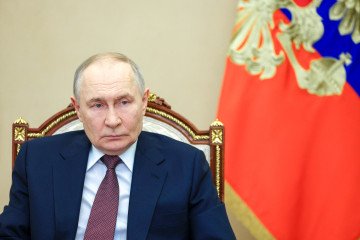Ukraine is fighting for its right to exist, in what many call the biggest war since WWII. People watch in terror, some call for peace talks, afraid that war will come knocking on their door. But can peace be achieved by talking to a regime that seems to habitually lie?
For two years, the world has watched in horror as Russia unleashed its brutal aggression on Ukrainian soil in the form of full-scale war. While calls for peace negotiations remain constant, a crucial question lingers: can genuine peace be achieved through dialogue with a regime notorious for breaking promises and escalating conflict? The answer, based on Russia’s historical behaviour and its tactics in this current war, seems to be a resounding no.
Would you ever negotiate with a liar?
Pattern, Not Anomaly
Ukrainian Foreign Minister Dmytro Kuleba has been an outspoken critic of the futility of negotiating with Russia. He has described Vladimir Putin as a “habitual liar,” highlighting the regime’s disregard for agreements and international commitments.
This isn’t just speculation; it’s a deeply entrenched pattern woven into the very fabric of Russia’s foreign policy.
Let’s take the Budapest Memorandum of 1994, intended to guarantee Ukraine’s security and sovereignty in exchange for its de-nuclearization. This wasn’t just a bilateral agreement; it was a cornerstone of European security architecture, painstakingly negotiated and hailed as a triumph of diplomacy. Yet, in 2014, Russia ripped this fabric of trust apart with the illegal annexation of Crimea, a watershed moment, revealing that Russia was willing to violate core norms of the international system to pursue its own interests. This wasn’t an isolated incident; it was a harbinger of things to come, at the same time rooting way back.
A disregard for agreements lies at the core of Russia’s foreign policy. The START nuclear arms treaties, hailed as a cornerstone of Cold War disarmament, were gradually eroded by Russia’s non-compliance, culminating in their eventual withdrawal. Additionally, the Conventional Forces in Europe Treaty, aimed at preventing military buildups in Europe, faced constant Russian violations, raising concerns about its future relevance. These cases, alongside the Budapest Memorandum, illustrate a worrying pattern — Russia seems to readily use agreements for tactical advantage, discarding them when they become inconvenient.
The 1997 Russian-Ukrainian Friendship Treaty met the same fate. The Minsk agreements serve as a chilling example. Signed in 2014 and 2015, these accords aimed to de-escalate the war in eastern Ukraine. However, as noted by the International Crisis Group, instead of paving the way for peace, Russia exploited the negotiations to solidify control, rearm separatists, and prepare for further offensives. Even the 2022 Black Sea Grain Initiative, hailed as a glimmer of hope in resolving the looming issue of global food shortage, faced constant disruption and ultimately, unilateral withdrawal by Russia.
A Scarred Post-Soviet Landscape
Now let’s take a look at a broader context of Russian aggression across the post-Soviet landscape. Understanding this wider picture is crucial to accurately assess the prospects of negotiations.
Chechnya serves as a chilling example. The war launched in 1994 resulted in widespread devastation and disregard for human rights. Grozny, the Chechen capital, was razed to the ground, and civilian casualties numbered in the tens of thousands. The war, marked by indiscriminate attacks, exposed the ruthlessness of the Russian military and its willingness to inflict immense suffering to achieve its objectives. Similar campaigns in Ingushetia and other regions cemented a pattern of aggression and disregard for international norms.
In 2008, Georgia witnessed another blatant violation of agreements and escalation of aggression. Despite an existing ceasefire, Russia launched a full-scale invasion, pushing Georgian forces back and occupying a significant amount of territory. This action, like the annexation of Crimea, served the dual purpose of undermining a neighboring state and asserting Russian dominance in the region. The ongoing tensions in South Ossetia and Abkhazia, fuelled by Russian support for separatist movements, are stark reminders of the lingering consequences.
Moldova also faces the shadow of unresolved conflict due to the breakaway region of Transnistria, where Russia maintains a military presence. This “frozen conflict” serves as a tool for exerting influence and destabilizing Moldova, demonstrating Russia’s willingness to weaponize separatism to achieve its strategic goals.
These examples are not isolated incidents; they form a distinct pattern of aggression and disregard for international norms that underline Russia’s foreign policy. Ignoring this context would be kind of like trying to understand a big dark forest by examining one little leaf.
Deception as Strategy, Lies as Currency
According to the Ukrainian Parliament’s Commissioner for Human Rights, it is estimated that Russia has breached nearly 400 international treaties since 2014 alone. This isn’t mere negligence; it seems to be a calculated strategy. Just days before the Russian full-scale invasion, Putin personally assured world leaders that there would be no attack, only to admit later that he personally gave the order to invade. Since then, ceasefire talks have repeatedly served as stalling tactics while Russia amassed troops and escalated violence. Humanitarian corridors, meant to be lifelines, became death traps, with medics and evacuees systematically targeted and used as bait, exposing the regime’s utter disregard for human dignity and international law.
Such flagrant disregard for basic humanitarian agreements exposes the true intentions of the regime and renders genuine peace through dialogue mute.
The Dangers of Appeasement
Proponents of negotiations often cite the risk of prolonged conflict and potential escalation as arguments for engaging with Russia. However, history offers a stark lesson: appeasement emboldens Russia, not the other way around. Every concession is seen as a weakness, an invitation to further aggression. The annexation of Crimea and the escalation of the war in eastern Ukraine stand as stark reminders of this dynamic.
Moreover, relying on negotiations carries significant risks beyond potential escalation. Engaging with Russia while it continues its aggression legitimizes its actions and undermines Ukraine’s right to self-defense. Additionally, prolonged negotiations under these circumstances risk solidifying the status quo, leaving Ukraine in a state of permanent insecurity and potential loss of statehood, at the same time fueling further aggression in the long run.
An Expansionist Hunger, A Revisionist Thirst
Which brings us to our final question for today: If Russia isn’t stopped, where exactly will Russia stop? Fortunately, we don’t have to look too hard for an answer. Col.-Gen. Andrey Mordvichev, a key figure in the invasion, declared that “the war will not stop [in Ukraine].” This statement, coupled with other concerning factors, paints a worrying picture.
Russian officials like Dmitry Medvedev, deputy chairman of the Security Council, openly glorify past imperial conquests, framing Ukraine’s distinct identity as a historical accident awaiting “rectification.” This narrative lays the groundwork for justifying further expansion under the guise of historical restoration. State-controlled media like RT consistently portrays neighboring countries and NATO members as threats to Russia’s security, culture, values, and statehood. Not to mention Putin’s unbelievable excursion into the mythical history of Ukraine, its “true” origin and borders in his interview with Tucker Carlson.
On top of all that, NATO expansion remains a flashpoint, stoking Russia’s anxieties about its “sphere of influence.” While predicting the future is impossible, ignoring these red flags is silly.
Defeating Russia in Ukraine sends a powerful message: expansionism and historical revisionism cannot be tolerated. It’s a critical step towards a secure future where territorial integrity reigns supreme.
The Path Forward
The alternative to relying on fruitless negotiations is multi-pronged and resolute. Strengthening sanctions, providing substantial military and humanitarian aid to Ukraine, and pursuing international justice mechanisms are crucial steps. Holding Russia accountable for its war crimes and ensuring its isolation from the global community is essential for building genuine peace not on empty promises, but on justice and deterrence.
This is not a call for perpetual conflict and “forever war”, but for clear-eyed realism and unwavering support for a nation fighting for its very existence, against a regime that has always weaponized negotiations for its own gain.
Ignoring history and trusting Russia’s empty promises risks not just prolonging the war in Ukraine, but emboldening an aggressor ready to exploit vulnerabilities beyond Ukraine’s borders.
Remember, the Ukrainian people are not simply fighting for their own freedom; they are fighting for the principles of sovereignty, territorial integrity, and international law that underpin global stability. Standing with them, holding Russia accountable, and refusing to be fooled by empty negotiations are not just moral imperatives; they are essential steps toward a future where genuine peace and security can prevail.
-5adb65e550f9dec24a01a35019e4b6b5.jpg)
-5b919ea27f9088ab17b3797faacca021.jpg)
-3db1bc74567c5c9e68bb9e41adba3ca6.png)




-f88628fa403b11af0b72ec7b062ce954.jpeg)